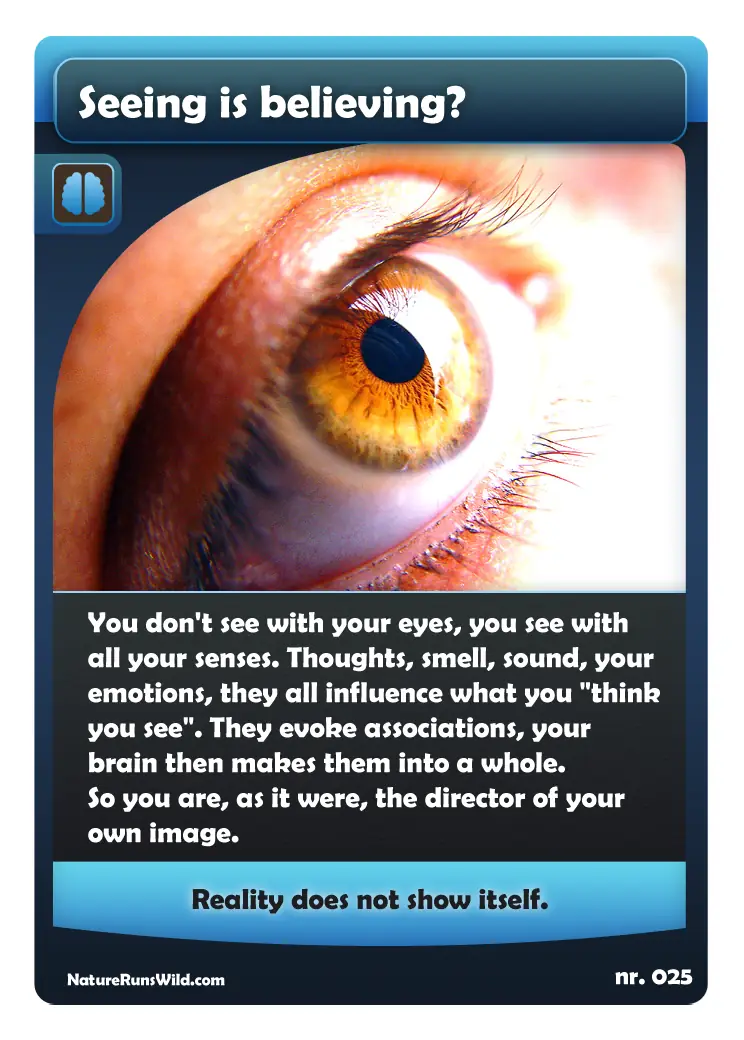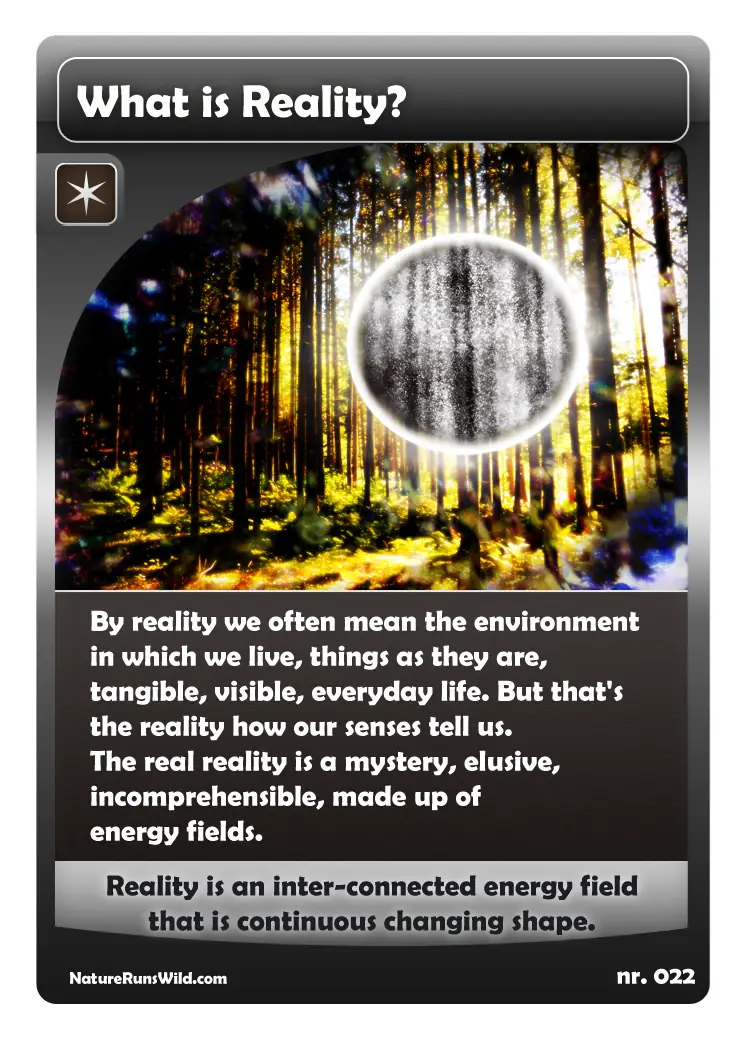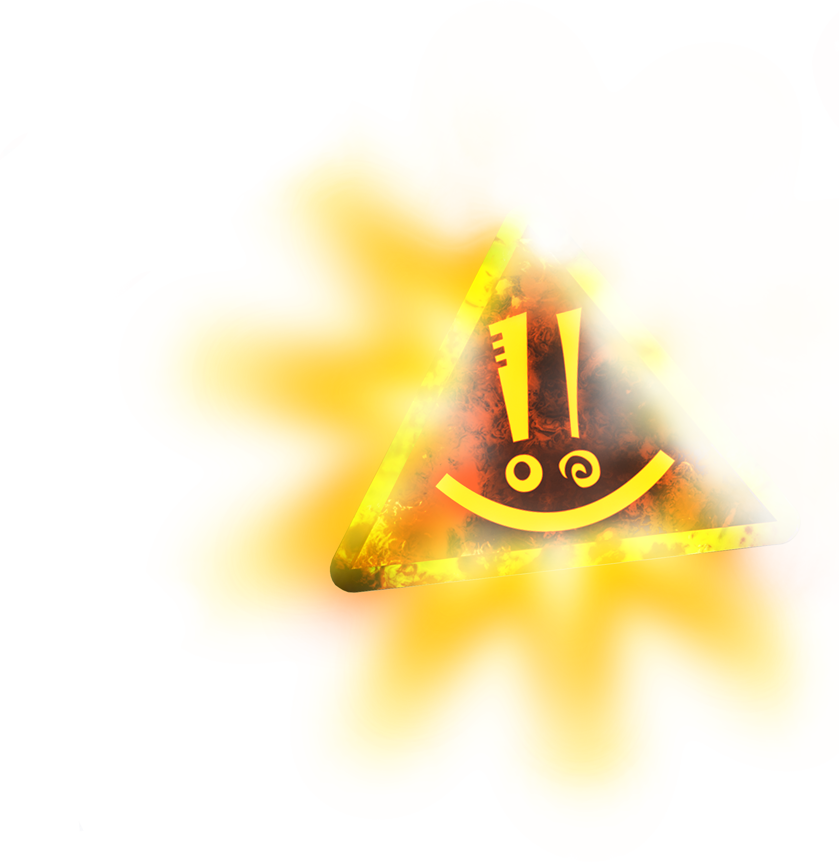
You don't see, you model.
Model like a bat
You must have once learned how a bat "views" its environment, namely by making a kind of sonar scan with sound (echolocation). With its sharp hearing, the bat can pick up the reflections of the sound and thus "make a model" of its environment, of reality. The (high) sound that bats use for this is usually beyond our human reach, we do not hear them. Some people do use echolocation. For example, a blind/visually impaired boy, who has taught himself to "scan" his environment with a click sound.
The simple reality of a bat?
At first you might think, what a simple image / model of reality that bat will have, compared to us. But if you take a moment to think and examine yourself, you will probably come to the conclusion that we humans view "our world" in much the same way.

What do you see as reality?
Instead of the reflections of sound, we primarily catch the reflections of light with our eyes. Those reflections create the basis of our environmental model. What you see (or experience as your environment) therefore depends primarily on your own measuring instruments. Your eyes measure the light reflections, your ears sound vibrations and your nose, tongue and nerves (feeling) all contribute to refining your picture of reality, your model of your environment. And on top of that comes a kind of automatic spelling checker, which corrects errors based on previously acquired knowledge and experience and fills in blanks. Did you just see a face in the rock formation? Or was it your internal spell checker, which thinks it sees a face and tries (forces) to make it. Spell checkers are very useful, but everyone is probably also familiar with the experience of automatically correcting an unknown word or less used combination of words. The spell checker limits your freedom and limits your creative wording.
What you see (or experience as your environment) depends primarily on your own measuring instruments and how they are processed.
What's in it for you?
The bat creates a model of its environment so that it can survive in it. The model he creates is (for now) "sufficient". We humans do exactly the same, in a way that is important to us. Our model is a bit more refined, but the idea of "model creation" still applies. A human being cannot perceive reality with his senses, but can only catch glimpses of it and use it to understand it. make the brain a (for us) correct model. For me personally it is a kind of "reminder" to the fact that we know nothing about reality, or about our existence. Even though you have learned a lot, life remains an incomprehensible mystery.
It's why we often call reality an illusion
In spiritual circles it is said that we live in an "illusion". I think a more precise wording is that we live in our constructed model of the world (our environment). The model never corresponds to the infinitely complex reality, of which we observe only a small part. In addition, the models of different people can vary a lot. Our model creates our own right, because our model wants to be correct, otherwise we will no longer understand the world. So for those who believe in Jesus, their model of reality will adjust accordingly. The same goes for Aliens, Gods and even conspiracies. Who can really "prove" what is true?
My right > then your right?
That's why "being wrong" is so annoying... you have to change your own beliefs (your model). We want our model to be correct. My model is correct! Otherwise I have wasted a lot of time and energy. But there are as many models as there are people. By including as many perspectives (of people, senses and technical measurements) as possible, you will get closer to reality or truth, but you will probably never reach it!
All too easily you (unconsciously) label your own model of reality correct. But it's a variant which includes prejudices.
Human
Insight, consciousness & psychology
Nature
Being a part of...
Society
Economy, power, money, property
Spirituality
Consciousness, belief & infinity
Cosmos
Universe, reality, coherence.
Science
Structure, models, (cut) limitations
Reality
That which cannot be simplified
Truth
A fragmented wholeness
Discrimination
Deviation: different & equal
Death
(Life + Death) = Transformation
